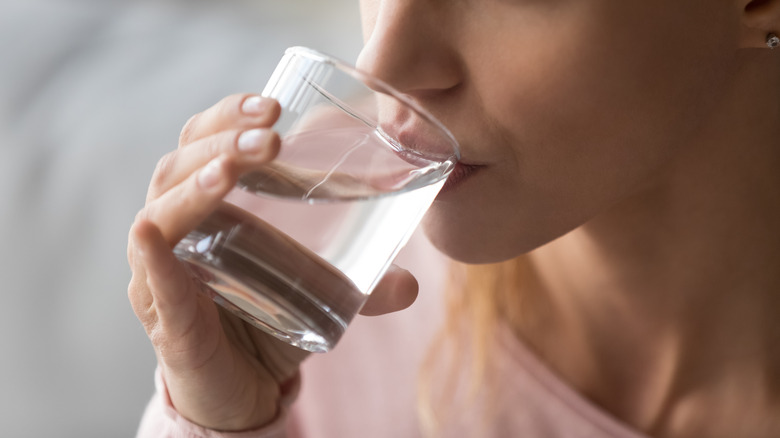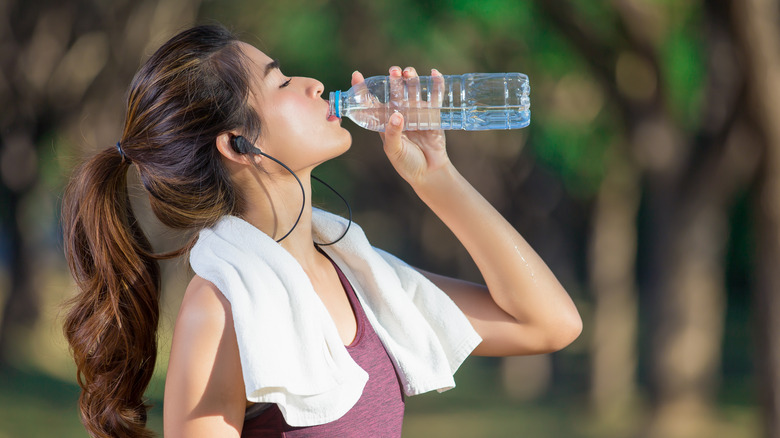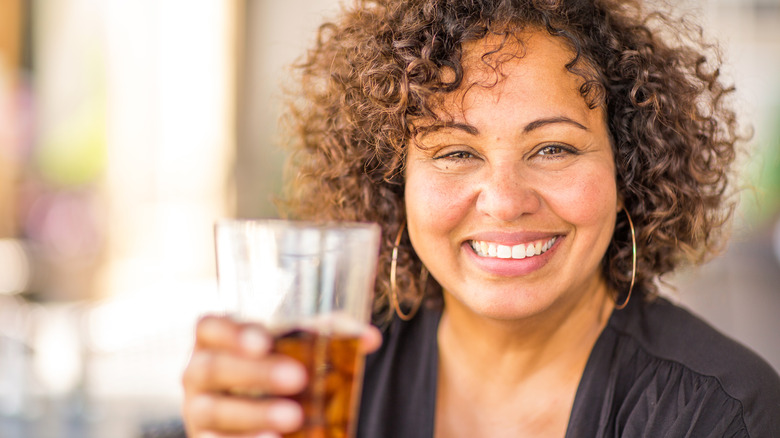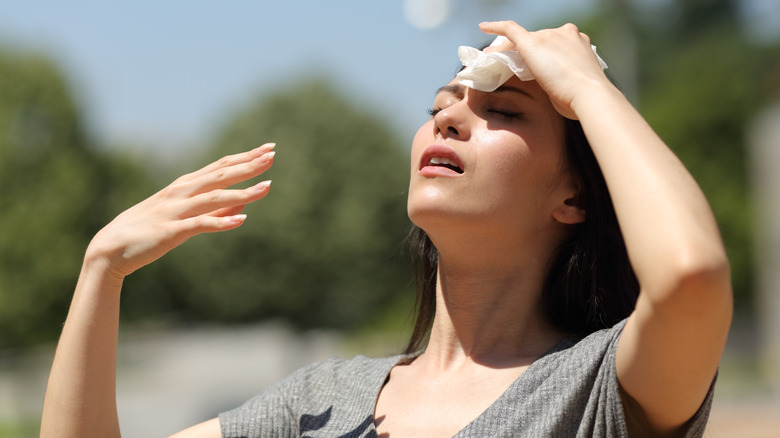Here's How Much Water You Should Actually Be Drinking
After a tough workout or spending all day in the sun, nothing quenches your thirst like a cold glass of water. Sure, you can also have different types of fruit juices or sports drinks, but there's something so satisfying about taking a big sip of just pure water. According to Healthline, there's also a variety of reasons we need to be drinking it that include flushing out waste, balancing our body temperature, and helping our brain to function properly. If that's not reason enough to enjoy some H2O, it can also help you to lose weight and even help to fight off illness. Sounds like it's pretty positive overall, however, it is possible to have too much of a good thing.
Over hydrating can cause water intoxication, which causes a disturbance in how your brain is able to function, per Medical News Today. Signs that you've drunk too much water include nauseous, confusion, or vomiting. It can also become life threatening because too much hydration can cause your cells to swell. Thankfully, there is an easy system to follow to make sure you're getting just the right amount of water.
Personal trainer explains how to know the exact amount of H2O you should be drinking
Founder and Head Nutrition Coach of Fuel Your Fitness, Georgette Naber, told the Food Network that getting the ideal volume of water is very important when it comes to performing at the top of your game. Naber recommends that to make sure you're getting the right amount "take your bodyweight, divide it by two then add 15." She says that's how many ounces of water you should be drinking per day, "plus another 17 to 20 oz. for every hour of exercise."
The personal trainer also suggests having a recovery shake after a hard workout. "During high-intensity training, our cortisol rises (which is our 'fight-or-flight' hormone)," Naber explains. "Having a carb immediately post-workout actually shuts off that response and puts your body in a position in which it can start recovering." Sounds like the perfect method to feel great after your next long run or weight training session.
Not all beverages are equally hydrating
As we've mentioned, water isn't the only beverage that contains, well, water. All liquids do and therefore should hydrate to some extent, at least in theory. However, not all beverages are necessarily going to be your best bet for rehydration. The Cleveland Clinic suggests that fruit juices, which tend to be high-carb and low-sodium, may cause some intestinal distress if you consume them when parched. While this institution also warns against rehydrating with caffeine due to its diuretic properties, some research suggests that iced coffee and tea really don't make you pee much more than water, so they actually can count toward your daily fluid intake.
Booze, however, is still a no-no for hydration purposes. As a liquid, it taketh far more than it giveth, since your body actively tries to flush it out of your system using any other liquids you've got in the tank. (Which is a very unscience-y way of expressing what it does, we know, but this isn't your professor's peer-reviewed journal, or anyone's for that matter.) What this means is, if you want to kick back with a beer after a hike, a workout, or other strenuous physical activity, you're advised to stick to a non-alcoholic brew, or at least to have no more than two low-ABV beers that you should probably offset with some supplemental water (or iced coffee, tea, etc.).
Here's what might happen if you don't get enough water
We've talked a little about the perils of overhydrating, and seriously, these dangers cannot be overstressed as it turns out that water intoxication kills more athletes on an annual basis than does failure to consume enough of the wet stuff. A greater danger most of us face, though, is that of dehydration, something that can prove fatal within just a matter of days. Of course, the kind of dehydration that ends in death occurs when you've had no fluids at all enter your body, so just being down a glass or two on your daily intake won't have such dire consequences.
Even slight dehydration, though, won't help you look and feel your best. If you're chronically dry, you could be constipated (water doesn't just exit your body in the form of urine), plus you may experience muscle aches or itchy, flaky skin. Mentally you won't be at your best, either, as you're likely to be tired and could even have some brain fog. If you're really not great at keeping track of such things as water intake, one way to see if you may be dehydrated is to check the color of your pee. If it comes out dark, this could be an indication that your fluid levels are low, so you should probably grab a non-alcoholic beverage ASAP and suck it down quick.



